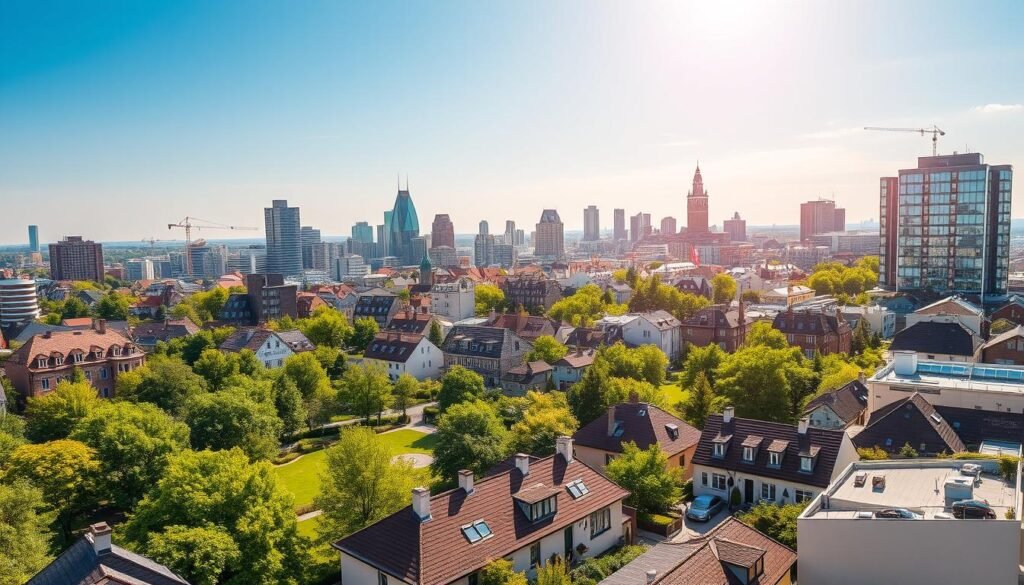Germany’s housing market has seen a huge jump in property prices, up by 60% in the last decade. This has raised big concerns about a German housing bubble. It’s crucial to look into what’s causing this rapid price rise and the risks it poses to the global economy.
This article will dive into the German housing market’s complex world. We’ll examine the historical trends, current affordability, and what’s driving the bubble. Understanding this will help us see how housing bubbles affect people, investors, and cities.
Key Takeaways
- The German housing market has experienced a 60% surge in property prices over the past decade, indicating the potential formation of a housing bubble.
- Factors driving the housing bubble include low interest rates, speculative investments, and a mismatch between housing supply and demand.
- Regional disparities exist, with urban hotspots like Berlin and Munich witnessing more severe price appreciation.
- The housing bubble poses economic risks, including the impact on households, investors, and the broader financial system.
- Policy responses, such as rent control measures and urban development initiatives, aim to address the housing affordability crisis.
Exploring the German Housing Market
Let’s dive into the German housing market. It’s key to know the historical trends that have shaped it today. Over the last decade, property prices in Germany have seen big changes. These changes show how the housing sector has evolved.
Historical Overview of Property Prices
In the early 2000s, the German housing market was stable. Prices were rising slowly. But as the decade went on, things changed.
Low interest rates and more investors led to higher prices in cities like Berlin, Munich, and Hamburg. This made property prices jump up.
Recent data shows the average home price in Germany has gone up by over 50% since the early 2010s. This fast rise has made housing less affordable. It’s especially tough for first-time buyers and those with lower incomes.
Current State of Housing Affordability
The rise in property prices has made housing less affordable in Germany. Owning a home is getting harder for many. This problem is worse in big cities, where prices are much higher than incomes.
| City | Median Property Price | Median Household Income | Affordability Index |
|---|---|---|---|
| Berlin | €500,000 | €55,000 | 9.1 |
| Munich | €800,000 | €65,000 | 12.3 |
| Hamburg | €550,000 | €60,000 | 9.2 |
The affordability index shows how hard it is for many to find affordable housing. In cities like Munich, the index is over 12. This means the average home costs more than 12 times the typical household’s yearly income.
Factors Driving the Housing Bubble
Exploring the German housing market reveals key factors behind the housing bubble. Low interest rates and speculative investments are the main drivers.
Low Interest Rates and Mortgage Lending
Low interest rates in Germany have been a big factor in the housing bubble. They make it simpler for people and investors to get mortgages. This has led to more demand for homes, pushing prices up.
Speculative Investments and Housing Speculation
Speculative investments have also grown in the German real estate market. Investors, both local and international, see big potential in real estate. This influx of money has made property prices soar, creating a bubble.
| Indicator | 2015 | 2020 | Percentage Change |
|---|---|---|---|
| Average Mortgage Interest Rate | 2.5% | 1.3% | -48% |
| Mortgage Loan Volume (in billions) | €250 | €320 | +28% |
| Real Estate Investment Transactions (in billions) | €50 | €80 | +60% |
The mix of low interest rates and speculative investments has sparked a frenzy in the housing market. It has pushed property prices to unsustainable levels.

Regional Disparities and Urban Hotspots
The German housing market shows big differences from one area to another. Some places see a housing boom, while others face high costs. Urban growth and a lack of homes are key reasons for these differences.
Cities like Munich, Berlin, and Frankfurt are hotspots for housing. They draw people looking for jobs and a lively city life. This influx of people has made housing prices and rents soar, often higher than the national average.
| City | Average Rent (€/m²) | Average Home Price (€/m²) |
|---|---|---|
| Munich | 18.50 | 7,200 |
| Berlin | 14.20 | 4,800 |
| Frankfurt | 15.80 | 5,500 |
On the other hand, rural and smaller cities face housing shortages. Young people and families move to big cities for jobs. This leaves smaller places with fewer people, unused buildings, and more housing problems.
- Big cities attract jobs and people, making housing there more sought after.
- Rules on building and limited space in crowded areas make homes expensive.
- The gap between city and country housing markets is hard for officials to fix. They aim to make housing fair for everyone in Germany.
Dealing with these differences requires a detailed plan. We need to find ways to make housing fair and meet the needs of all people in Germany.
German Housing Bubble
Germany’s housing market has seen a big increase in property prices, sparking worries of a housing bubble. This situation needs a close look to understand its causes, timeline, and current status.
The German housing bubble grew due to low interest rates, more mortgages, and real estate speculation. Fast-rising prices, especially in cities, have made homes hard to afford for many.
Let’s look at the main points of the German housing bubble:
- Timeline of the bubble’s development: Property prices started going up in the early 2010s. They’ve been rising faster in recent years.
- Current state of the market: Housing prices in Germany have hit new highs. Some areas, like Berlin and Munich, have seen huge price jumps.
- Regional disparities: The German housing bubble affects the whole country. But cities like Berlin and Munich are hit harder, making homes less affordable.
Understanding the German housing bubble is key to seeing its effects on the economy, families, and investors. By diving into this, we can learn more about the housing market’s future and what policies are needed to tackle these issues.

“The rapid rise in German property prices is a clear indication of a housing bubble that poses significant risks to the overall economy.”
Consequences of a Potential Market Crash
The German housing market is facing concerns about a potential bubble. It’s important to look at what could happen if the market crashes. This could affect the economy, households, and real estate investors a lot.
Economic Implications
A housing market crash would hurt Germany’s economy a lot. If home prices drop, people might spend less. This could slow down the economy, affecting jobs, taxes, and financial stability.
Impact on Households and Investors
Households and investors would also be hit hard. Homeowners might end up owing more on their homes than they’re worth. This could cause financial problems, foreclosures, and a drop in wealth. Investors could lose a lot, causing more economic trouble.
To avoid these problems, it’s key for everyone to watch the market closely. Policymakers, banks, and individuals need to be ready for a crash.
Policy Responses and Rent Control Measures
In Germany, the housing affordability crisis has led to new policies. These aim to make homes more affordable and stable. They help ensure everyone can find a place to live.
Rent control is a key policy. The German government has set limits on how much rents can go up. This helps keep rental prices from rising too fast, easing the burden on tenants.
The government also boosts funding for social housing. This creates more affordable homes for those who need them most. It helps protect low-income families from the housing bubble.
| Policy Measure | Objective | Impact on Housing Affordability |
|---|---|---|
| Rent Control Regulations | Limit the rate of rent increases | Helps to stabilize rental prices and provide relief for tenants |
| Increased Investment in Social Housing | Expand the supply of subsidized, affordable housing units | Improves access to housing for low-income individuals and families |
These policies have shown some positive results. Yet, there’s ongoing debate about their long-term success. It’s important to keep improving these measures to tackle the housing affordability issue in Germany.

“Rent control is a necessary intervention to protect vulnerable populations from the negative impacts of a housing bubble, but it must be carefully designed and implemented to avoid unintended consequences.”
Urban Development and Housing Shortages
Our cities are growing fast, making urban development and housing shortages big issues. In Germany, where homes are expensive, we need to find ways to make living affordable. We must create sustainable solutions that meet the needs of more people while keeping communities livable.
Sustainable Solutions for Housing Affordability
To solve housing shortages, we need a variety of strategies. One good idea is to promote urban densification. This means building more homes in cities by adding multi-family buildings and mixed-use projects. It helps fix the housing problem and makes cities more sustainable and walkable.
- Incentivize the construction of affordable housing units, including subsidized rental properties and shared-ownership models.
- Invest in public transportation infrastructure to improve connectivity and reduce the need for private vehicle ownership.
- Implement inclusionary zoning policies that require a certain percentage of new developments to be dedicated to affordable housing.
- Promote the use of innovative construction techniques, such as modular and prefabricated housing, to increase the speed and affordability of new home construction.
By adopting these sustainable solutions, we can aim for a future where urban development and housing affordability go hand in hand. This will improve life for everyone in our communities.
“Sustainable urban development is not just about building more homes; it’s about creating vibrant, livable communities that meet the diverse needs of our growing population.”
Real Estate Investment Strategies
The German housing market is facing a potential bubble. Investors must weigh the risks and rewards carefully. Navigating the German housing landscape requires a detailed strategy. This strategy must account for regional differences and market dynamics.
Diversifying Investment Portfolios
Diversifying portfolios across different asset classes and regions is a smart move. This strategy helps reduce risks from a housing bubble. It allows investors to tap into other markets that are doing well.
Focusing on Rental Properties
Rental properties are a solid investment in areas where housing demand is high. By choosing the right locations and managing well, investors can earn steady income. They also benefit from property value growth over time.
Embracing Innovative Financing Strategies
Responsible lending and alternative financing are key to managing real estate risks. Options like crowdfunding, syndicated investments, or partnerships with big investors can help. They provide access to capital and reduce individual risk.
As the German housing market changes, investors need to stay informed and flexible. By balancing risks and rewards, they can succeed in this dynamic market. They can also seize new opportunities.

“The key to successful real estate investing is to carefully evaluate the risks and rewards, and then implement a diversified strategy that aligns with your investment goals and risk tolerance.”
International Perspectives on Housing Bubbles
Looking at the German housing market, we must also consider the global scene. Understanding how other countries view housing bubbles helps us see our own situation clearly. By studying housing markets worldwide, we learn about the causes of these bubbles and their effects on the global market.
Jeremy Grantham, a well-known investor, has shared his thoughts on the global housing market. He warns of a 30% drop in real estate prices in the next few years. The US market seems stable, but Canada and Australia might see bigger price drops. This is because their housing prices are growing faster than people’s incomes.
| Country | Housing Bubble Risk | Reasons |
|---|---|---|
| Canada | High | Rapid housing price growth outpacing income growth |
| Australia | High | Significant price appreciation in housing market |
| United States | Moderate | Lower use of adjustable-rate mortgages, improved borrower credit profiles |
These views from around the world show us the importance of understanding the global real estate market. When we look at the German housing market, we should also think about what’s happening in other countries. This helps us spot risks and find ways to fix problems.
“The U.S. housing market is not in a bubble, but countries like Canada and Australia are more vulnerable to price declines due to faster-growing housing prices relative to incomes.”
The Role of Responsible Lending Practices
In the German housing market, responsible lending is key. We’ll see how it affects housing costs and market stability.
Responsible lending is vital for a healthy housing market. Lenders who focus on responsible mortgage lending make sure borrowers can afford their loans. This reduces the risk of defaults and keeps the market stable. It helps both individual buyers and the German housing market as a whole.
By setting high standards and checking if borrowers can repay, lenders avoid bad debt. This stops the market from getting too risky, like in the 2008 crisis.
“Responsible lending practices are crucial in maintaining a stable and accessible housing market. They protect both borrowers and the overall economy from the pitfalls of unchecked speculation.”
Responsible lending also builds trust between lenders and borrowers. It lets homebuyers make smart choices, knowing their mortgage fits their financial future.
Policymakers and industry leaders must focus on responsible lending practices. By doing so, we can make housing affordability a reality for German families.

Housing Market Forecasts and Future Trends
The German housing market’s future is full of both chances and hurdles. Experts have shared insights and analyzed data to show what the market might look like in the years to come.
Expert Insights and Data Analysis
Leading analysts say the housing market forecast is mixed. Some areas might see growth due to more people moving in and the economy doing well. But, other places could face a housing bubble bursting.
The future trends in the German housing market are influenced by many things. These include:
- Changing demographic patterns and shifting population dynamics
- Ongoing developments in mortgage lending and interest rate policies
- The impact of regulatory measures and rent control initiatives
- Evolving investor sentiments and speculative activities
Deep data analysis shows the market might stay stable overall. But, some cities could see big price swings. Experts say we need to work together to keep housing affordable and stable.
| Key Market Indicators | Current Trends | Projected Outlook |
|---|---|---|
| Home Prices | Steady year-over-year growth | Moderate price appreciation expected |
| Rental Rates | Increasing in major cities | Potential for stabilization with policy interventions |
| Mortgage Affordability | Declining due to rising interest rates | Gradual improvement anticipated with policy adjustments |
| Housing Inventory | Insufficient supply in urban areas | Gradual increase in new construction expected |
As we look at the housing market forecast and plan for the future trends, expert insights and data analysis are key. They help guide policymakers, investors, and homebuyers.
Real estate: These rural areas have seen the fastest price increases over the past year
REAL ESTATE: THESE RURAL AREAS HAVE SEEN THE FASTEST PRICE INCREASES OVER THE PAST YEAR
Conclusion
The German housing market is facing a big challenge with a growing bubble. The prices of existing homes in Germany have already dropped by 14%. This shows a big change in the market.
To tackle this problem, we need a balanced and sustainable solution. Rent control and more affordable housing are key. These steps can help stabilize the market. We also need to promote responsible lending and sustainable urban growth.
As the real estate market worldwide changes, it’s crucial for everyone to stay informed. Understanding the German housing bubble can help us improve other markets. Together, we can make housing more affordable and sustainable for everyone.



